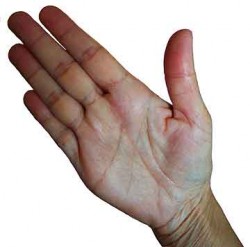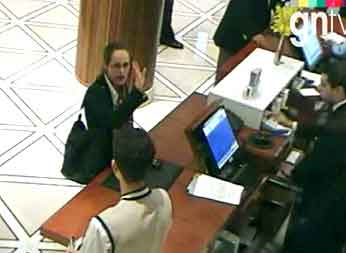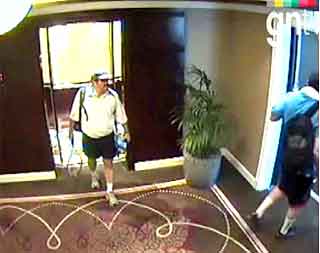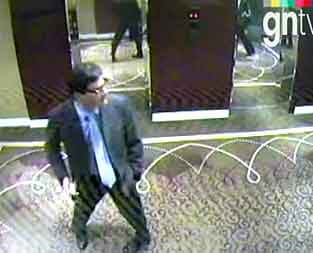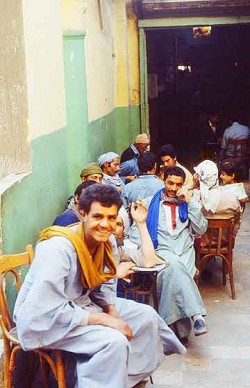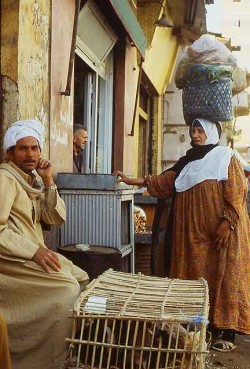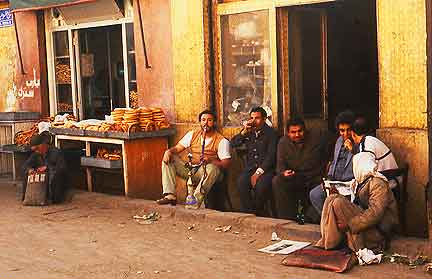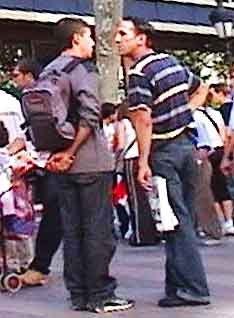“I loved your show.”
Bob and I both had our mouths full of Roquefort and pears and sourdough croutons. We raced each other to swallow awkwardly in order to answer. The man stood at our table expectantly and watched us chew. One of us finally managed a polite reply.
“You’re really good at reading people,” the man continued, and went on, full of praise and compliments. He was referring to a routine in our show in which Bob analyzes the personalities of five or six audience members. It had gone especially well that night and the man was raving about it. Bob and I set our knives and forks down and smiled up at him while he recalled “a similar show” in which a woman’s brassiere was ripped off.
We detest the comparison to this goofy magician’s coup, but we nodded and smiled some more. Our courtesy encouraged him. He gestured with enthusiasm, sloshing a bit of red wine onto the table. I folded my hands in my lap and realized the bouillabaisse would arrive before we finished our first course.
The man was now relating how he was almost pickpocketed once, long ago. Oh, you’ll like this story, he promised, and asked permission to sit down. Sure, we had to say, but my smile was thin. The man launched into his ancient near-catastrophe. Just as he was getting to the good part, how he foiled the theft before it ever happened, his wife arrived at our table, wine in hand.
“Oh, he hasn’t imposed himself, I hope,” she said. “Shelly, why are you sitting at their table? They’re trying to have a nice dinner.”
“I’m not bothering them, we’re having good conversation!” he said jovially. “They look conservative but I bet they like to get wild! We can join you, if you like,” he suggested. “I’m sure the waiter wouldn’t mind moving our plates! And a bottle of wine, please!” He gestured to a hovering waiter.
“Of course we won’t do that, Sheldon! Get up right now and let’s leave these people alone.” The woman turned to me. “I’m very sorry, he must be a little drunk.”
“Not at all! Sit down, Phyll. I’ll tell the waiter.” The man rose.
“Shelly, don’t be rude. You can’t just—”
“You’re welcome to sit,” I finally said, “just please don’t stand over us arguing.”
That was all it took. The couple’s cold, half-eaten meal was quickly brought to our table and Bob and I picked up our silverware. At least we didn’t have to say much. The man was full of stories and his wife supplied timely prods. Bob made appropriate replies, dredging up authentic courtesy from some stale reserve. My well was dry.
The bouillabaisse arrived steaming; its clear broth, fragrant with fennel, covered barely-cooked fish. I had the distinct impression that the couple had designed their finagle from the start, despite their bickering role-play. The way the wife sauntered over with her lipsticky wine glass, like a suburban housewife ready for twilight gossip. Why, otherwise, were their plates brought over so readily? And the bottle of wine. They must have cued the waiters. I took another sniff of soup scent and lifted my spoon.
“I know!” the man said looking at me. “Let me read your hand. You’ll love this.”
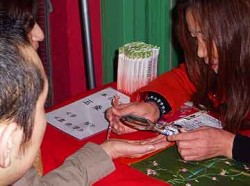
“He’s really good at it,” his wife said. Silver charms on her necklace flashed as she leaned back anticipating our satisfaction.
“Hold up your right hand.”
I dropped my spoon and limply raised my hand, wondering how long I had to allow this. We’d intentionally taken a table at the back of the restaurant, but that had meant parading through the whole room.
“No, fingers together. Open your hand hard!”
Yes, like a protest, I thought. Enough!, I silently gestured at him. Stop! But he didn’t read my mind or body language. He was going to read my palm and I gave him the pose he wanted.
“I can see right away that you don’t like spending money. Your lifeline is long, but your loveline is broken. You’ve had multiple relationships, yes? Or you will.” He stretched to pour me some wine. “I think you like the lifestyle…?”
I gave away nothing with my stoneface. I felt mean and I wasn’t going to let him cold-read me. I took a spoonful of broth, noticing a faint essence of orange peel.
“No, I’m not finished! Hand up!”
I put my hand up obediently and tuned out as the man droned on. My anger brewed and my tolerance withered. We’re often interrupted at meals, but most people are polite enough to keep it brief. And how many simply forego interrupting our meal at all?
“isn’t he wonderful?” the wife was saying. “Is he right? Isn’t he exactly right?”
“You’ve said a lot,” I offered, “and it was remarkable. I’ll have my dinner now, before it gets cold.” I wished for once that Bob would tone down his manners. He was too gracious about the intrusion. As always just after a show, he was high on endorphins, talkative. I was the only sourpuss.
I imagined the accidents that could occur with shellfish in broth. How well could I aim a recalcitrant mussel shell? I’ve splashed myself enough times to know how to orchestrate a brothy geyser. Or, the crab claw—might it squirt when I straighten the joint? Amusing myself this way made me feel a little better. What the hell, we were in it. Can’t change the situation now.
“This is only the second time he’s read someone’s hand,” the wife said. “Really, he doesn’t do it all the time. I don’t know what made him do it. It’s hot in here, isn’t it? Are you hot?” She waved her hand in front of her neck, then lifted her silver necklace, as if it to let air under it, or to dislodge it from sweaty skin.
And of course, calling attention to her delicate chain made me notice the oddness of its four silver charms. They were two identical male gender symbols, and two identical female symbols.
Bob and I worked on our soup while the couple egged each other on with their stories. I guzzled the Chardonnay, thinking another bottle would be fair compensation.
The couple was not particularly obnoxious. The man, Sheldon, had certainly behaved badly when he imposed himself and then his wife. He didn’t notice (or ignored) my discomfort when he insisted on reading my hand. So he had poor judgment. Or was a little drunk. A life-of-the-party type, he’s probably accustomed to spicing up dull conversations. Full of himself, though, he failed to pick up our signals.
Maybe we failed to pick up his, too. Was this some sort of pitch or come-on? Did we miss some subtle clues embedded in Edward’s hand-reading blather? Maybe I should have paid attention.
Bob and I excused ourselves before dessert, preempting the invitation I now think would have been inevitable. But we’ll never know what Phyll and Shelly were plotting or what activities they had in mind.
I often struggle with the choice between courtesy and honesty. I’d like to practice both, but sometimes the two are mutually exclusive. In this situation, I was neither. And I hated it. Honesty was not called for, but I should have been able to dredge up some grace, if not courtesy.
![]()


